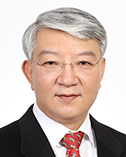
Sang Yup Lee
KAIST (Korea Advanced Institute of Science & Technology)
|
Primary Section: 31, Engineering Sciences Secondary Section: 44, Microbial Biology Membership Type:
International Member
(elected 2017)
|
Biosketch
Sang Yup Lee is Distinguished Professor of Chemical and Biomolecular Engineering, KAIST. He is also Vice President for Research, Director of BioProcess Engineering Research Center, and Director of Bioinformatics Research Center. He served as the Founding Dean of College of Life Science and Bioengineering, and also Dean of KAIST Institutes at KAIST. He is fellow of Korean Academy of Science and Technology, National Academy of Engineering Korea, American Academy of Microbiology, American Institute of Medical and Biological Engineering, World Academy of Sciences, National Academy of Inventors, American Association for the Advancement of Science, American Institute of Chemical Engineers, and Society for Industrial Microbiology and Biotechnology. He is also International Member of both National Academy of Sciences and National Academy of Engineering, USA. He has served as a Chairman of the Global Agenda Council on Emerging Technologies, and also the Global Future Council on Biotechnology at World Economic Forum. He received numerous awards including National Science Medal, National Order of Merit-Red Stripes, Samson Prime Minister’s Prize, Eni Award, James Bailey Award, Marvin Johnson Award, HoAm Prize, and POSCO TJ Park Prize, among others. His research interests include metabolic engineering, industrial biotechnology, synthetic biology, and systems biology. He pioneered systems metabolic engineering.
Research Interests
Sang Yup Lee established and pioneered a new field of “systems metabolic engineering”, which integrates systems biology, synthetic biology and evolutionary engineering with metabolic engineering, thus allowing much more efficient development of industrially competitive microbial strains producing chemicals, fuels and materials. He developed various experimental and computational tools and strategies for systems metabolic engineering. Using systems metabolic engineering strategies, he developed numerous microbial strains and processes for the bio-based production of gasoline, ultra-high molecular weight spider silk, plastic monomers (1,4-diaminobutane, 1,3-diaminopentane), terephthalic acid, glutaric acid, one-step fermentative poly(lactate) and poly(lactate-co-glycolate), to name a few. In addition to these chemicals and materials he biologically produced for the first time, he also developed several microbial strains and processes that are highly efficient for commercialization. He expanded his works toward efficient microbial production of natural compounds, including drugs, flavor and fragrance, and health-promoting compounds. More recently, he is employing machine learning and artificial intelligence in microbial strain design, bioprocess development, drug development, and other biotechnological processes of importance.

